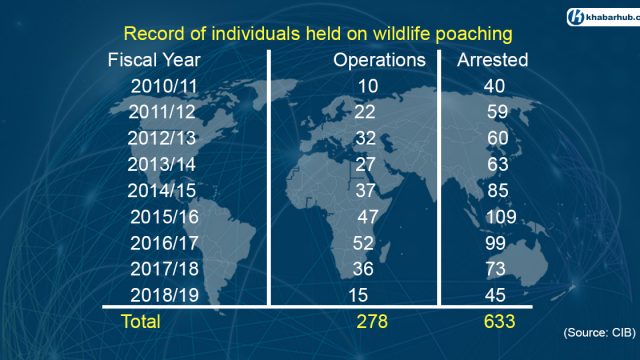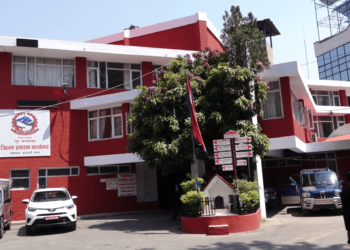KATHMANDU: Unbridled wild-life poaching, destruction of wildlife habitats, shortage of food, and trade of wildlife body parts are posing serious threats to wildlife conservation.
An analysis on the records of the seized body parts of wild animals and an investigation of the people arrested in connection with the smuggling of the banned body parts of animals reveal that poachers are using Nepal as a transit point, said former Deputy Inspector General of Police (DIG), Hemanta Malla.
International smugglers including from India are using Nepal as a transit point for smuggling body parts of the wild animals.
In the last nine years, the Central Investigation Bureau (CIB) of Nepal Police carried out a total of 278 operations leading to the arrest of 633 individuals, and a seizure of a large of amount of wildlife body parts.
In recent days, poachers have been targeting mostly rhinos, tigers, leopards, bears, red panda and pangolin for their body parts, according to the statistics maintained by the Nepal Police.

Poachers mainly target a rhino’s horn and hide while the tigers and leopards are hunted for their hide. Similarly, a bear is poached for its gall bladder and claws while a pangolin for its scales. Others targets of poachers are pythons, eagles and owls.
The conservation of leopard, pangolin and red panda have become challenging in recent times in Nepal, according to police.
Police have seized only a pangolin alive along with its scales. Besides, they have also recovered hides of three leopards, their claws and teeth.
A police investigation shows that animal body parts are smuggled to China, Vietnam, Japan, and Cambodia in cahoots with locals through a coordinated network.
Poaching of these rare animals occurs in Nepal, according to Anupam Rana, Deputy Superintendent of Police (DSP).
Poaching of leopard, red panda and pangolin has increased in the past three years.
Nepal emerging as a transit point for smugglers
International smugglers including from India are using Nepal as a transit point for smuggling body parts of the wild animals.
A police investigation shows that animal body parts are smuggled to China, Vietnam, Japan, and Cambodia in cahoots with locals through a coordinated network.
Only the porters hired by smugglers get arrested.
The porters are from working family background and are uneducated while the smugglers are powerful having a connection with the international mafia, according to DSP Rana, who is also a spokesperson of the CIB.
Legal provision
The transaction of wildlife body parts is a crime against the National Wildlife and Convention Act, 1973 and Convention on International Trade in Endangered Species (CITES), 1975.
Those who commit such crimes are sentenced from five to 15 years in prison along with a fine of Rs 50,000 to 100,000.
Nepal Police, Nepal Army, Department of Forest, Department of National Park and Wildlife Conservation are mobilized for the conservation of wildlife.
Similarly, some non-government organizations are also contributing to wildlife conservation.
Wildlife smuggling in Nepal can be controlled only through sound coordination among all the stakeholders, said former DIG Malla.









Comment